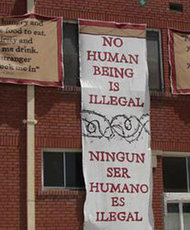Representatives from several states, including Indiana, Mississippi, and Oklahoma, have introduced bills in their state legislatures intended to deny Americans the fundamental protections of the 14th Amendment by requiring states to deny standard birth certificates to many U.S. citizen babies born in the U.S. to immigrant parents. The proposed legislation would also require all people in the U.S., whether citizens or not, to prove their status before they can receive a standard birth certificate for their baby. Supporters of these measures claim that citizens of other countries are crossing into the U.S. with the goal of having babies within our borders, to ensure undocumented parents an advantageous familial connection within the United States.
Fortunately, it seems as though logic, law, and facts may be turning the tide against these proposals. In the last week, South Dakota, Montana, and Arizona all shot down attempts by state legislatures to amend birthright citizenship. Recognizing that hateful, xenophobic bills won’t fix our country’s immigration issues, lawmakers in these three states blocked what could have been dangerous threats to our nation’s civil liberties.
The proposed legislation directly contradicts the 14th Amendment guarantee that all people born in the U.S. and under its jurisdiction are citizens of the U.S. and the state in which they reside and subject to equal protection under the law. If enacted, the bills are unlikely to survive legal scrutiny since the Constitution can only be changed by amendment, not by state or federal statute.
Adopted in the aftermath of the Civil War, the 14th Amendment negated one of the Supreme Court’s most infamous rulings, the Dred Scott decision of 1857, which held that neither freed slaves nor their descendants could ever become citizens. The Amendment, which conferred the rights of citizenship on all who were born in this country, including freed slaves, was enacted in response to laws passed by the former Confederate states that prevented African Americans from entering professions, owning or leasing land, accessing public accommodations, serving on juries and voting.
In 1898, the U.S. Supreme Court addressed the guarantee of the 14th Amendment and affirmed the fundamental principle that children born on American soil are U.S. citizens without regard to their parents’ status. In United States v. Wong Kim Ark, the Court held that a baby born in San Francisco to Chinese parents -- subjects of China prohibited by law from becoming U.S. citizens -- was a citizen at birth under the 14th Amendment. This principle has been the settled law of the land for more than a century.
News / Commentary
- Anchoring Equal Protections (2/16/2011)
- ACLU Calls On Congress To Reject Proposed Resolution To Subvert 14th Amendment (1/27/2011)
- ACLU Calls On House To Reject Unconstitutional Bill To Subvert 14th Amendment (1/6/2011)
- ACLU Urges State Lawmakers To Reject Discriminatory Bills That Subvert 14th Amendment (1/5/2011)
- ACLU Lens: Citizenship At Birth Under the 14th Amendment (1/5/2011)
- New York Times: Birthright Citizenship Looms as Next Immigration Battle (1/4/2011)
- Wall Street Journal: The Case For Birthright Citizenship (8/11/2010)
Resources / Reports
- Frequently Asked Questions: Defending Citizenship Under the 14th Amendment to the U.S. Constitution (1/4/2011)
- Defending the 14th Amendment (8/19/2010)
- Wikipedia: United States v. Wong Kim Ark
- The 14th Amendement
Share on Facebook » or Twitter »
Tags: immigration, 14th Amendment


